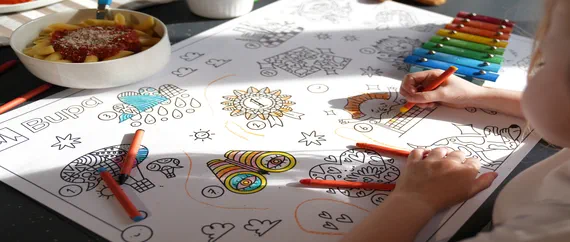Mental health at home
Families don’t talk enough about mental health. We’re here to help you open up, support your family to do the same and find a resolution together.
It’s time to talk family mental health
The Bupa Table
Pull up a chair to talk about mental health with your family. With the help of Harry and Izzy Judd, we’re giving real families the chance to open up and support each other through honest conversations. It’s time to lay it all on the table. This is health.
Watch videoKNOCK KNOCK
Room for two more?
Harry?
McFly?
Yes.
Izzy, Harry from McFly's wife.
Yeah.
Hello, Hunt family,and welcome to the Bupa Table.
This is a safe space for us to all talk about our mental health and how it can affect us.
Nothing is off this table, so don't be shy.
Do you guys often sit down as a family and have meals together and a chance to talk?
Our dining table is the main part of the house. At least on a Sunday all the children are home and we have dinner. It’s the one thing that naturally brings you together and then the conversations happen and things come out, in fact a lot of things come out that you probably don't want to, but it just pushes the doors ajar that'll lead to the deeper conversations.
We're all rushing around, life is so busy and I just think
you know, it's so important to find that time,
to discuss these difficult topics.
It is the only moment we have to sit and debrief.
Do you guys find that,
you know your mum and dad are quite open books
and allowed you to able to be comfortable
having these kind of conversations?
Yeah, I'd definitely say so.
I think, I think we was always really encouraged,
like it was quite frustrating as a kid when your mum was asking
like, "are you alright?" She knows you're not alright.
Yeah.
And you say, “yeah I’m fine,
I’m fine, just leave me alone.”
Like, I used to take drugs before, it had become a real problem.
But when I opened up to my family, my parents, there was a really great sense of freedom and it really did me a lot of good going forwards.
As you say, a lot of the reasons people fall into addiction or problems in life is because of things they're going through that they are not willing or comfortable to talk about.
When you've got somebody struggling like they are the whole house is upside down.
It was destroying the three girls as well at home.I was already, like, struggling with my mental health.I had a, quite severe problem with self-harm at the time,I'd struggle and then I'd take it out on myself.
I'd try and hide it, but then a few days later, they'd catch me, they’d see it.
And at the time, mum didn't know how to cope with it, so she saw it, she'd just get really angry.
It's so difficult as parents to know how to respond.
Anger is often the first thing you go to, because it's the emotion that covers up feeling scared yourself.
You think, “What can I do to fix it?” That's what you want to know.
You want to just fix it, don't you? Yeah.
You'll demand an answer from me of what you can do and, like, that doesn't help.
Okay, so what would it be?
Rather than to come in and fix the problem, to try and understand what the problem is
before trying to come up with a magic solution which isn't there.
So, if there was one thing you guys could give another family as a piece of advice, what would it be?
To ask, like, “Are you alright?”
It's very important because sometimes they don't want to talk about it.
But just through that little nudge, “You know, you don't seem yourself today.
What's going on?”
That's really important, yeah.
Hearing what you guys have been through and hearing how open you are is inspiring for us.
You know, we definitely want to try and achieve that as a family.
And I think around the kitchen table is just the perfect environment to have those conversations and, actually talking about your mental health should be celebrated and
should be seen as a sign of strength.
For more information and guidance on ways to support
your family through mental health challenges,
visit bupa.co.uk/familymatters
Dive deeper into the themes explored at the Bupa Table
Talk about it
How to have conversations to express how you’re feeling - and get others to do the same.
Sobriety and addiction
Living a balanced lifestyle can boost mental health. But help is available if you’re struggling with addiction.
Advice for parents
Find out what affects us when we’re young, and how to approach sensitive subjects with your children.
Free colouring in table mats
Brighten up your mealtime with our fun colouring mats. With prompts and cute illustrations to colour, they're perfect for sparking chats with your children about mental health.
Illustrations by Mr Woody Woods.

Mental health throughout the family
Understand, identify and get support for what might be affecting you or someone in your family.

Depression
What to do if you or a family member is experiencing depression.

Dental anxiety
How to manage a fear of visiting the dentist.

Support during menopause
How to provide emotional support to a loved one during menopause.
Mental health resources
Practical information to help the whole family approach the topic of mental health carefully and effectively.

Parent’s guide to children's mental health
An in-depth guide to what might be affecting your child’s mental health, and how you can provide support.

Toolkit for caregivers
Our toolkit contains help and advice for caregivers supporting those with mental health conditions.

Conversation cards
Useful prompts for approaching difficult topics without breaking your child’s boundaries.
Explore more mental health topics
How Bupa can help you and your family
Family health insurance
Get health insurance for the whole family with Bupa Family+.
GP for mental health
Talk to a mental health specialist in confidence.
Have a health question?
Get free advice from health experts on a wide range of conditions.


